(Last updated May 2017)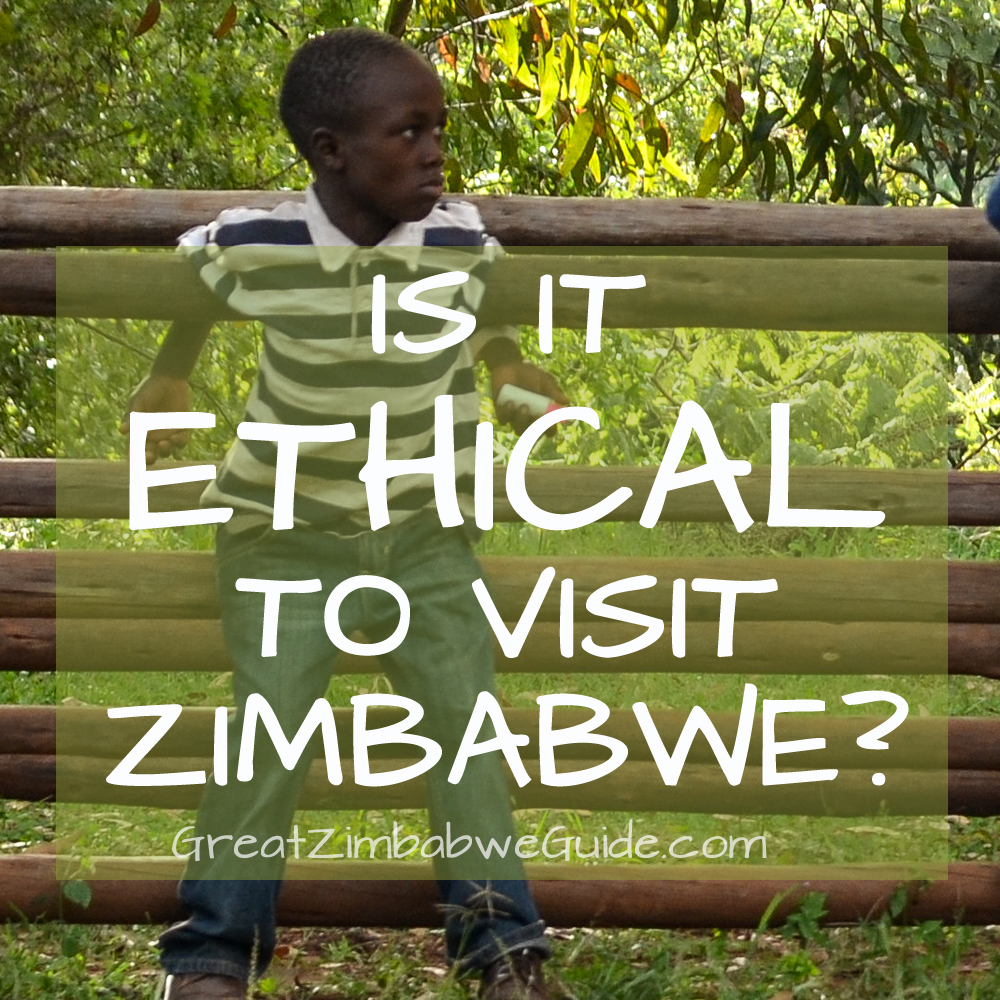
Should I visit Zimbabwe?
There has been much debate about the role of tourists in Zimbabwe’s politics. Some say that tourists should avoid Zimbabwe to make a statement against President Robert Mugabe and his party Zanu-PF. Boycotters say that if they visited Zimbabwe they would be supporting an undemocratic regime. I can empathise with this stance. It’s no secret that this government has a poor track record of reports of human rights abuses, political violence, state propaganda and wildlife mismanagement. Zimbabwean people have had over 10 years of economic and political suffering, however, I think tourists – responsible tourists – are much needed.
I would like to caveat this post by saying that although I think tourists should visit Zimbabwe, this does not include trips solely affiliated with the Zimbabwean government. My opinion is that people should travel independently, and should avoid government-owned hotels. On this blog, I do not promote Zimbabwe companies that operate unethically. Note that The Zimbabwe Tourism Authority, or “Zimbabwe: World of Wonders”, or Zimbabwe Tourism, are all under the Zanu-PF Zimbabwean Minister of Tourism, under the Zimbabwe Government. You can read more about my thoughts on the question of tourism and government partnerships in my TBEX Africa 2018 post here.
A note about political violence: Visitors do not need to be worried about general violence in Zimbabwe because they are not political activists. I visited just after the 2013 election results were announced, and had one of the best holidays of my life (link here). I’ve dedicated a full article about Safety in Zimbabwe which you can read here.
“Political statements” are ineffective
For the average tourist, avoiding Zimbabwe to make a “political statement” is a fruitless gesture. It benefits no-one, and the Zimbabwean government has proved to be immune to it. In the years between 1999 and 2007, tourist numbers were at an all-time low, and yet this didn’t seem to have much effect on the government. They were running the country according to their own rules, and tourism wasn’t even a part of the game. In 2002, the EU placed sanctions on key government individuals, but even these have now been lifted on all players except Mugabe. The EU now admits that the sanctions didn’t bring about reform, rather, they provided a propaganda weapon and scapegoat for Mugabe.
They were running the country according to their own rules, and tourism wasn’t even a part of the game.
When tourists visit Zimbabwe, they pay entry fees to Zimbabwe National Parks, and 15% VAT, both of which go to the government. But if this income decreased due to low tourism numbers, what would happen? The government would still have Zimbabwe’s gold, platinum and diamond reserves – a much bigger piggy bank. Or, they would raise funds by selling Zimbabwe’s elephants and wildlife to foreign zoos. This has already been happening, sadly.
Tourists can, however, make a statement by choosing travel companies with proven track records of community development projects, conservation investment and employee reward schemes. Such companies do exist, and they are the reason Zimbabwe tourism hasn’t crumbled to the ground. The information is usually easy to find on their websites.
Employment and empowerment
By visiting Zimbabwe instead of avoiding it, you can help sustain the livelihoods of many Zimbabwean people who work in the tourism industry and related businesses: their wages help them to support themselves so that they can send their children to school and support their wider communities. You can choose lodges that invest in community development programmes. Many tourism companies in Zimbabwe are privately owned which means that a large proportion of money spent at these camps, as well as tip money to serving staff, does not go to the government – it goes to private businesses and the people who work for them.
I’m not saying that tourists should give vast amounts of money as over-generous tips to Zimbabweans in an effort to ‘help’ them – this doesn’t solve any long-term problems – rather, it creates them. There are many well-run Zimbabwean schools, charities and organisations that can put the money to better use (if anyone’s in the giving mood). Tourism helps create employment and sustainable opportunities for people in Zimbabwe.
Tourism has become Zimbabwe’s second largest contributor to Gross Domestic Product after mining, and much of the revenue from tourism directly benefits people within the industry, not just the government. Great Zimbabwe Guide supports the tourism and arts industries, and hopes that their continued growth will help lead the country to economic stability.
 Conservation of wildlife and habitats
Conservation of wildlife and habitats
Zimbabwe has priceless riches in its wildlife and natural areas – some of which are the some of last of their kind in the world. Without people visiting the national parks, the habitats and their animals could become overrun by poachers, trophy hunters, commercial developers and overpopulation. Many safari lodges and tourism companies recognize this and are actively involved in development and conservation projects. Money spent by patrons at the safari lodges contributes to these projects that protect the national parks and precious wildlife.
I’ve seen that without tourism, Zimbabwe’s wildlife and habitats suffer. If there are no tourists, there’s no push to protect the rhino, elephant, lion and other animals that live in Zimbabwe. If there are no tourists, wild places will be transformed into power plants and shopping malls; wild animals will be sold to zoos or worse. The more visitors to the national parks, the more likely the parks and wildlife will be seen as an investment to be protected. Tourists to Zimbabwe can increase the positive impact by choosing tour companies and lodges with proven track records of helping local conservation groups.
Dispelling stereotypes
Zimbabwe is poorly represented and poorly understood in international circles. Most people on this planet will never have the opportunity to visit it. This article on Matador Network highlights some of the misconceptions about Zimbabwe: it’s extremely dangerous; the wildlife has all been wiped out; there’s not much to do except safari (to name a few). I know people who simply didn’t think there was much worth seeing in Zimbabwe – until they saw my photos. The more people who visit Zimbabwe, the more stories are shared with friends, and the more we can break some of the fallacies that are drifting around out there.
The power of human interaction
Too often, the idea of ‘travel’ is reduced to pithy sayings, or seen as just a business. We forget that travel is often about people – people wanting to expand their understanding of how things work outside their own daily lives. When people from different places are confronted with an alternative idea or way of life, they often challenge and improve themselves for the better. This works both ways – for both the person visiting a new country and for the people in the country being visited. Zimbabwe isn’t a North Korea-style controlled experience – you have the freedom to travel where you want and interact with the people that you meet.
Zimbabwe state media often portrays the West as an enemy, to distract people from the country’s current problems. It presents people in the West as power-hungry, evil colonizers who just want to take all they can get. Yet most people in Zimbabwe I’ve met don’t believe this at all – primarily through their first-hand interactions with people from other walks of life.
I’ve had good conversations with people working in the travel industry about big issues like women’s rights, freedom of speech and good governance – and I have a hunch that these world views have been partly shaped by visitors who have shared their own life stories. Of course, people who see Zimbabwe’s sights shouldn’t be limited to Western visitors: People from Africa and Zimbabwe itself can gain so much from the region.

Personal enrichment
Every time I’ve gone back to Zimbabwe I’ve been personally challenged, rewarded and invigorated. I’ve surprised myself in the things that I’ve done, I’ve stretched myself, learned more on what life’s really about.
Zimbabwe and its people will teach you many things, both spiritual and mentally, if you let it. A number of friends of mine have visited Zimbabwe for the first time, and upon leaving, they are united in their comments: Zimbabwe changed something that will profoundly affect them, even when they return home.
You’ll meet people who have little material possessions – people whose houses often have water and power cuts, and yet they have more insight and life-purpose than a successful businessman. It’s encounters like these that make a holiday more than just an escape from daily life, if you allow it. They do something inside you that influences your daily life for years to come.
What’s the big deal about the government?
I’ve expressed my support for travel to Zimbabwe, but not at any cost. As mentioned, I think they should be done independently and avoiding government-affiliated stakeholders where possible. I’ve noticed that there’s an opinion in some circles that only white people are critical of the Zimbabwean government, and that most black people in Zimbabwe are fine with their way of life. Whilst the majority of Zimbabwe critics that are publicised in Western media are indeed white, remember this: one of the features of white privilege is having greater freedom to criticize institutions and having less fear of punishment by those in power. Those white journalists and bloggers are (sadly) at greater liberty to express themselves.
In Zimbabwe, it was against the law merely to insult the president (until recently), and police were able to enforce this liberally. Zimbabweans have tried to speak up through demonstrations, rallies and peaceful marches by citizens – many of them ended in police beatings and imprisonment. Some people who express their dissidence simply go missing and never return. This kind of intimidation has a profound effect on citizens and it’s arguably one of the reasons Mugabe has stayed in power for so long, and why you don’t read as much about this online as you’d hope. Please do read the articles below, many of them written by black Zimbabweans, so that you can say with good conscience that you’ve researched the Zimbabwe question. Check out the names of the people who wrote the articles, and the ownership of the websites, so that you can see it’s not just white people who are concerned about this issue.
The story of Itai Dzamara, written by his wife | The nationwide eviction of thousands of city dwellers | The sale of wild baby elephants to China | The story of Evan Mawarire | Photos of people beaten up by police in Zimbabwe | How the ruling party withholds food from the poor in return for votes | An analysis of police harassment of people in Zimbabwe | Linda Masarira’s jail story | How government ministers spend money on gold-plated sneakers | The “missing” $15 billion of taxpayer’s money | The VP’s 50-bedroom house. Also, why not follow some recommended Zimbabwean writers and #ThisFlag on Twitter for some homegrown opinions.
I’m not the only one who thinks people should visit Zimbabwe: See this Africa Geographic article, Conde Nast article, San Francisco Chronicle article, Outpost article, this article by Paul Murray and also my About page which discuss this topic of ethical travel in Zimbabwe further. I’ve also written an extended article related to this topic in relation to the TBEX 2018 announcement of partnering with the Zimbabwe government for its TBEX Africa conference, which you can read here. Also see the page Online findings for links to other respected media outlets on Zimbabwe. See the Practical info page for more FAQs.

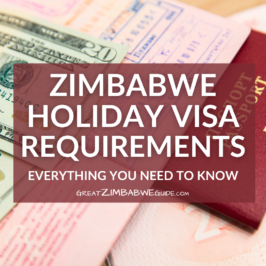
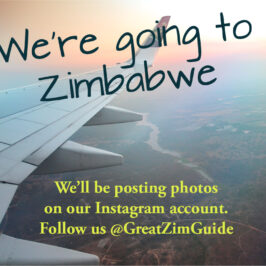
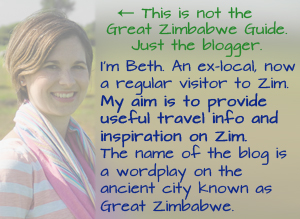
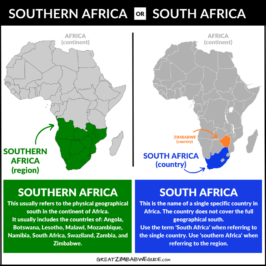
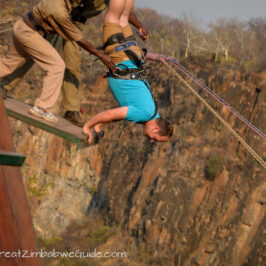

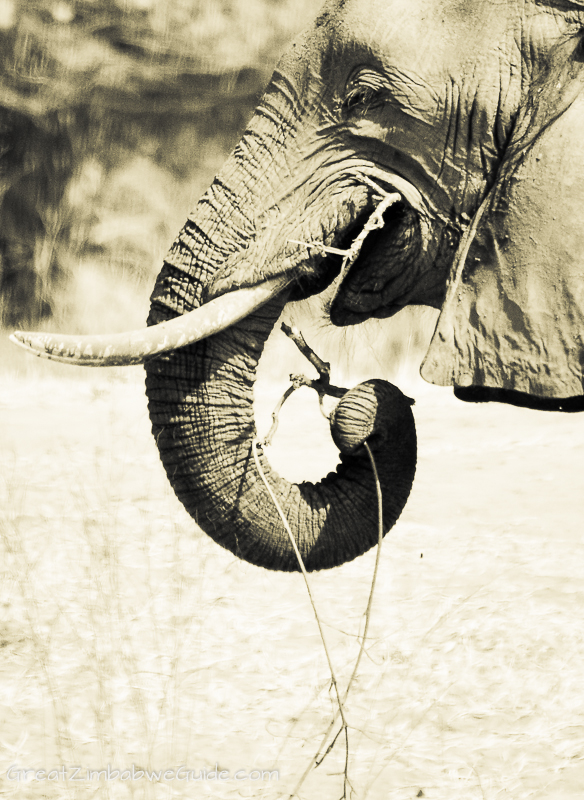
dawn ravenhill
Beth. Thank you for this level insight in to today’s Zimbabwe. Having spent a lifetime wanting to spend some meaningful time working in Africa, now my children are grown and left home, I am able to fulfill this need. I felt open to whatever crossed my path, and Zimbabwe is subsequently where I am headed next July. I am reading voraciously, and your article is so heartening. I am beyond excited at visiting Zimbabwe and meeting her people. I have chosen to visit as an eco-tourist and spending a month at the Chipangali Wildlife Orphanage. I know many people think I am reckless,and fear what they do not understand, however, my only fear is of not wanting to come home! I look forward to reading many more of your articles.
The unexamined life is not worth living. Socrates
Dawn Ravenhill
Great Zimbabwe Guide
Hi Dawn, thank you for your comments. I hope you have a fantastic time in Zimbabwe – and feel free to send me an article about it so that others can be inspired too! Beth
Jennifer Coleman
Thank you for sharing this piece. I found your article both well-written and informative. I have heard on multiple occasions of the transformative power of travel and tourism, and your piece puts a human face and experience to that transformation. I believe that humans on an individual level are capable love, kindness and understanding if they are only allowed to get to know one another. As travelers and travel writers we have the power to initiate change on a basic human level. I believe that it is important to show governments and agencies our values through our dollars, such as visiting the national parks. This shows that we value the animals in their natural habitat instead of valuing say….another shopping mall.
Socrates says “There is only one good, knowledge, and one evil, ignorance”